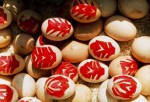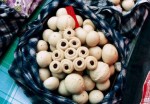Posts Tagged ‘Folk Arts’
Social Context of Folk Arts – Birth
The carriers of folk art are folk social customs. The original philosophy and visual image based on folk art is the product of the Chinese community and has become ingrown in people’s social life. Its all time theme of life and propagation meets the needs in different aspects of life, displaying its beauty in a variety of colorful ways. The “red egg” from the maternal family sent on the first full month of a new born, with papercut “evergreen tree” pasted on it, a folk custom along the Yangtze River.
The “red egg” from the maternal family sent on the first full month of a new born, with papercut “evergreen tree” pasted on it, a folk custom along the Yangtze River.
What is the theme of human birth? First it is to know where life comes from; and then to wish that the newborn grows up healthy and strong. Human life comes from mother’s body of the universe, which the Chinese believe is as primeval as pigeon eggs, and from mother’s body of totem animals. Therefore, it is customary to give chicken eggs, which are known as the “red egg” in Hunan in the Yangtze River valley. People also paste paper-cut “The tree of life” in bright red color on the red eggs as good-wish for the newborn. In the Yellow River basin where flour is a staple food, people make steamed bread, symbolizing the domed universe. Inside the bread are red beans implying that a new life has been conceived; “Wonton” steamed bread are made with two curly twists, implying the unification of yin-yang that creates life on earth. In Shanxi and Shaanxi, birth bread is called “Wonton,” or “Grain twist.”
 Human life comes from mother ’s body of totem animals, god of propagation. In areas where people worship legendary animals or totem animals like the turtle, the snake, the fish and the frog; and in places where supernatural power becomes personalized in “Baby with coiled hair;” birth presents from the maternal family are pillow case with patterns of a paired fish (yin-yang), or a paired turtles and a paired frogs. There are also embroidery patterns of “Crawling baby with coiled hair” (this is very similar to the design on the porcelain pillow from northern China in Song, Yuan, Ming and Qing dynasties.) It is interesting to note that a diamond shaped symbol like a female uterus is placed in the center among the animals, implying that the new baby comes from mother’s body of legendary animals or god of propagation.
Human life comes from mother ’s body of totem animals, god of propagation. In areas where people worship legendary animals or totem animals like the turtle, the snake, the fish and the frog; and in places where supernatural power becomes personalized in “Baby with coiled hair;” birth presents from the maternal family are pillow case with patterns of a paired fish (yin-yang), or a paired turtles and a paired frogs. There are also embroidery patterns of “Crawling baby with coiled hair” (this is very similar to the design on the porcelain pillow from northern China in Song, Yuan, Ming and Qing dynasties.) It is interesting to note that a diamond shaped symbol like a female uterus is placed in the center among the animals, implying that the new baby comes from mother’s body of legendary animals or god of propagation.
In areas where people worship tiger, the gifts are “Wonton” steamed bread painted with patterns like a snake with a tiger head (the sky) and a fish tail (the earth); with the entire living world on its back. At birth, one month anniversary, and the first birthday, the baby sleeps on a “tiger head” pillow; wearing a tiger cap and a pair of tiger head shoes and a tiger head undergarment. He looks just like a descendant of the tiger totem family. In areas where people worship sheep, it is popular to make “floury sheep” bread. In Hebei and Shanxi area, it is two sheep sharing a common head; or sheep head with fish tail; implying the unity of yin-yang; or a herd of three sheep to mark a new beginning of life. Each year, the “Sheep Day” festival in Hebei Ci County at the end of wheat harvest season draws large crowds. Relatives from the maternal family make big baskets of “floury sheep” bread for their daughter’s babies. Those who live far away come on bikes or tractors. A large herd of floury sheep are displayed in front of the baby. The presentation usually includes a big round wanton jujubes sandwich bread in the center, symbolizing the universe, surrounded by a paired sheep with one head (yin-yang sheep) and a huge herd of baby sheep. The first three years after the baby is born are given big sheep, second and third year are large-to-medium and medium in size, and the subsequent years will be small sheep until he/she gets married. Floury flower dragon with a tiger head and a fish tail, carrying all living things in the universe on its back (Houma, Shanxi).
In today’s folk custom, the 12 animals of earthly branches that differentiate the year of birth still hold a wide-spread popularity. People take it seriously about the nature of the animal for the year they were born, and often wear a jade adornment of their own animal on birthdays. This too is an extension of the totem animal culture from primitive society to modern life. The same is true with the concept of the “descendant of dragon” in China.